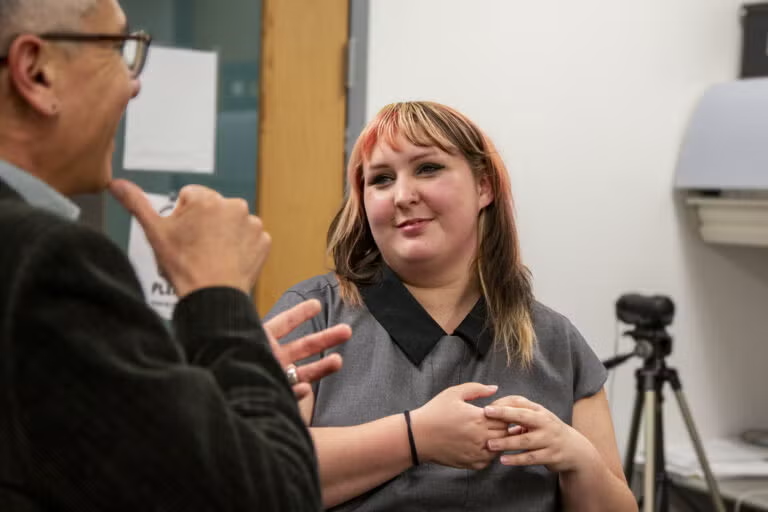Harrington Fellowships Support Graduate Research
Harrington Fellowships Support Graduate Research
Bridging the past and present, two graduate fellows shared insights from their experience and detailed how the program turned the tides for their studies.
Established by Sybil Harrington in memory of her late husband, the Harrington Fellows Graduate program funds outstanding master’s and doctoral students at The University of Texas at Austin with a $45,000–50,000 stipend, travel resources for conferences or other scholarly avenues, and coverage for tuition, fees and medical insurance.
Taking a literal deep dive into her scholastic past, Dr. Carly Kenkel reminisced about her time as a Harrington fellow in 2013–14, during which she studied the local adaptation of a broadly distributed coral species, Porites astreoides, in the Florida Keys. Specifically, the Fellowship funded the final chapter of her dissertation, in which she investigated an early observation in her research more thoroughly: Understanding the underlying characteristics that contribute to an increased temperature tolerance in nearshore populations of the coral.
Working alongside her advisor, Dr. Misha Matz, a professor in the College of Natural Sciences, Kenkel discovered that inshore coral is genetically more adaptable when exposed to external stress, such as temperature changes. Her findings were later published in the journal Nature Ecology & Evolution.
Now the Wilford and Daris Zinsmeyer Early Career Chair in Marine Studies in the Department of Biological Sciences at the University of Southern California, Kenkel explained that competitive stipend funding for doctoral students is dwindling. Doctoral students are expected to take on duties for their department, such as teaching or being a laboratory aid. When they are under financial distress and must find additional work on top of their departmental responsibilities, their capability to conduct thorough, meaningful research becomes limited.
Body Paragraph
Body Paragraph

Carly Kenkel, Ph.D., Wilford And Daris Zinsmeyer Early Career Chair In Marine Studies, Department of Biological Sciences, University of Southern California
“With the support of Harrington, I had time to focus on my final dissertation chapter and apply for an NSF postdoctoral fellowship, which was a springboard for my academic career. I don’t think I could have completed that application without the additional support.”
– Dr. Carly Kenkel
Both Kenkel and current doctoral Fellow Taylor Joyce agreed the Harrington program also spurred a sense of comradery and connection with its luncheons and other events that often brought together graduate and faculty cohorts.
Joyce came to UT Austin for both professional and personal reasons. Her niche interest in how cognitive disability influences the psychological process of learning signed languages leaned into the expertise of the Linguistics Department. Also, Austin brought her home to Texas and closer to family.
But when Joyce initially arrived at UT in 2019, campus shut down amid COVID-19, effectively cutting off the Texan community that Joyce sought to return to. Fortunately, Harrington continued to host virtual events that gave her a chance to build a network until the Forty Acres returned to in-person operations and the program could continue its usual receptions, luncheons and learning events.
Under the mentorship of Dr. David Quinto-Pozos, professor in the College of Liberal Arts, Joyce is currently investigating how disability affects the language learning processes of second language learners of American Sign Language (ASL). She’s particularly interested in how ADHD influences visual processing and language learning in adults that are first-time signed language learners. Her research includes a mix of quantitative and qualitative methods. In addition to independently designed experiments that study sign language learning processes, she also conducted interviews with ASL teachers about their experience with disabilities and accommodation in the classroom. She hopes to expand this to include student interviews as well.
The Harrington Fellowship has provided Joyce with opportunities to attend conferences each year to present research and meet with scholars in related fields.

Taylor Joyce, Harrington Graduate Fellow, College of Liberal Arts, The University of Texas At Austin
“The Harrington Fellowship singlehandedly enabled me to come to UT Austin and pursue my PhD. I’m a first-generation college graduate from a low-income background, without the benefit of external financial support. The generous funding through Harrington allowed me to comfortably transition into my PhD and focus on my studies.”
– Taylor Joyce
Learn more about the Harrington Fellows program by visiting https://harrington.utexas.edu/.